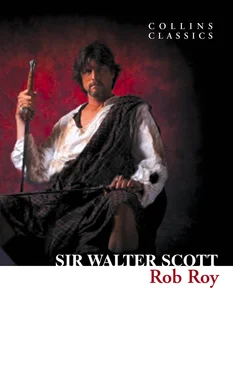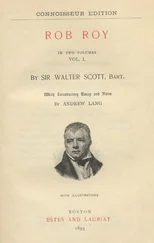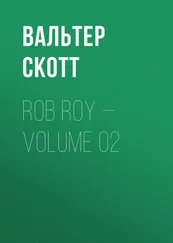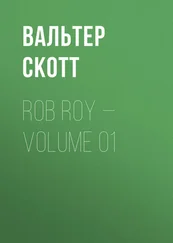Hence, too, Scott took the description of the rise of Glasgow. Thus Scott was taking pains with his preparations. The book was not written post-haste. Announced to Constable early in May, the last sheet was not corrected till about December 21, when Scott wrote to Ballantyne:—
DEAR JAMES,—
With great joy I send you Roy.
’T was a tough job,
But we’re done with Rob.
“Rob Roy” was published on the last day of 1817. The toughness of the job was caused by constant pain, and by struggles with “the lassitude of opium.” So seldom sentimental, so rarely given to expressing his melancholy moods in verse, Scott, while composing “Rob Roy,” wrote the beautiful poem “The sun upon the Weirdlaw Hill,” in which, for this once, “pity of self through all makes broken moan.”
Some stress may be laid on the state of Sir Walter’s health at this moment, because a living critic has tried to show that, in his case, “every pang of the stomach paralyses the brain;” that he “never had a fit of the cramp without spoiling a chapter.” – [Mr. Ruskin’s “Fiction Fair and Foul,” “Nineteenth Century,” 1880, p. 955.] – “Rob Roy” is a sufficient answer to these theories. The mind of Scott was no slave to his body.
The success of the story is pleasantly proved by a sentence in a review of the day: “It is an event unprecedented in the annals either of literature or of the custom-house that the entire cargo of a packet, or smack, bound from Leith to London, should be the impression of a novel, for which the public curiosity was so much upon the alert as to require this immense importation to satisfy.”
Ten thousand copies of a three-volume novel are certainly a ponderous cargo, and Constable printed no fewer in his first edition. Scott was assured of his own triumph in February 1819, when a dramatised version of his novel was acted in Edinburgh by the company of Mr. William Murray, a descendant of the traitor Murray of Broughton. Mr. Charles Mackay made a capital Bailie, and the piece remains a favourite with Scotch audiences. It is plain, from the reviews, that in one respect “Rob Roy” rather disappointed the world. They had expected Rob to be a much more imposing and majestic cateran, and complained that his foot was set too late on his native heather. They found too much of the drover and intriguer, too little of the traditional driver of the spoil. This was what Scott foresaw when he objected to “writing up to a title.” In fact, he did not write up to it, and, as the Scots Magazine said, “shaped his story in such a manner as to throw busybodies out in their chase, with a slight degree of malicious finesse.” “All the expeditions to the wonderful cave have been thrown away, for the said cave is not once, we think, mentioned from beginning to end.”
“Rob Roy” equals “Waverley” in its pictures of Highland and Lowland society and character. Scott had clearly set himself to state his opinions about the Highlands as they were under the patriarchal system of government. The Highlanders were then a people, not lawless, indeed, but all their law was the will of their chief. Bailie Nicol Jarvie makes a statement of their economic and military condition as accurate as it is humorous. The modern “Highland Question” may be studied as well in the Bailie’s words as in volumes of history and wildernesses of blue-books. A people patriarchal and military as the Arabs of the desert were suddenly dragged into modern commercial and industrial society. All old bonds were snapped in a moment; emigration (at first opposed by some of the chiefs) and the French wars depleted the country of its “lang-leggit callants, gaun wanting the breeks.” Cattle took the place of men, sheep of cattle, deer of sheep, and, in the long peace, a population grew up again – a population destitute of employment even more than of old, because war and robbery had ceased to be outlets for its energy. Some chiefs, as Dr. Johnson said, treated their lands as an attorney treats his row of cheap houses in a town. Hence the Highland Question, – a question in which Scott’s sympathies were with the Highlanders. “Rob Roy,” naturally, is no mere “novel with a purpose,” no economic tract in disguise. Among Scott’s novels it stands alone as regards its pictures of passionate love. The love of Diana Vernon is no less passionate for its admirable restraint. Here Scott displays, without affectation, a truly Greek reserve in his art. The deep and strong affection of Diana Vernon would not have been otherwise handled by him who drew the not more immortal picture of Antigone. Unlike modern novelists, Sir Walter deals neither in analysis nor in rapturous effusions. We can, unfortunately, imagine but too easily how some writers would peep and pry into the concealed emotions of that maiden heart; how others would revel in tears, kisses, and caresses. In place of all these Scott writes:—
She extended her hand, but I clasped her to my bosom. She sighed as she extricated herself from the embrace which she permitted, escaped to the door which led to her own apartment, and I saw her no more.
Months pass, in a mist of danger and intrigue, before the lovers meet again in the dusk and the solitude.
“Mr. Francis Osbaldistone,” cries the girl’s voice through the moonlight, “should not whistle his favourite airs when he wishes to remain undiscovered.”
And Diana Vernon – for she, wrapped in a horseman’s cloak, was the last speaker – whistled in playful mimicry the second part of the tune, which was on my lips when they came up.
Surely there was never, in story or in song, a lady so loving and so light of heart, save Rosalind alone. Her face touches Frank’s, as she says goodbye for ever. “It was a moment never to be forgotten, inexpressibly bitter, yet mixed with a sensation of pleasure so deeply soothing and affecting as at once to unlock all the floodgates of the heart.”
She rides into the night, her lover knows the hysterica passio of poor Lear, but “I had scarce given vent to my feelings in this paroxysm ere I was ashamed of my weakness.”
These were men and women who knew how to love, and how to live. All men who read “Rob Roy” are innocent rivals of Frank Osbaldistone. Die Vernon holds her place in our hearts with Rosalind, and these airy affections, like the actual emotions which they mimic, are not matters for words. This lady, so gay, so brave, so witty and fearless, so tender and true, who “endured trials which might have dignified the history of a martyr, … who spent the day in darkness and the night in vigil, and never breathed a murmur of weakness or complaint,” is as immortal in men’s memories as the actual heroine of the White Rose, Flora Macdonald. Her place is with Helen and Antigone, with Rosalind and Imogen, the deathless daughters of dreams. She brightens the world as she passes, and our own hearts tell us all the story when Osbaldistone says, “You know how I lamented her.”
In the central interest, which, for once, is the interest of love, “Rob Roy” attains the nobility, the reserve, the grave dignity of the highest art. It is not easy to believe that Frank Osbaldistone is worthy of his lady; but here no man is a fair judge. In the four novels – “Waverley,” “Guy Mannering,” “The Antiquary,” and “Rob Roy” – which we have studied, the hero has always been a young poet. Waverley versified; so did Mannering; Lovel “had attempted a few lyrical pieces;” and, in Osbaldistone’s rhymes, Scott parodied his own
blast of that dread horn
On Fontarabian echoes borne.
All the heroes, then, have been poets, and Osbaldistone’s youth may have been suggested by Scott’s memories of his own, and of the father who “feared that he would never be better than a gangrel scrapegut.” Like Henry Morton, in “Old Mortality,” Frank Osbaldistone is on the political side taken by Scott’s judgment, not by his emotions. To make Die Vernon convert him to Jacobitism would have been to repeat the story of Waverley. Still, he would have been more sympathetic if he had been converted. He certainly does not lack spirit, as a sportsman, or “on an occasion,” as Sir William Hope says in “The Scots’ Fencing Master,” when he encounters Rashleigh in the college gardens. Frank, in short, is all that a hero should be, and is glorified by his affection.
Читать дальше











